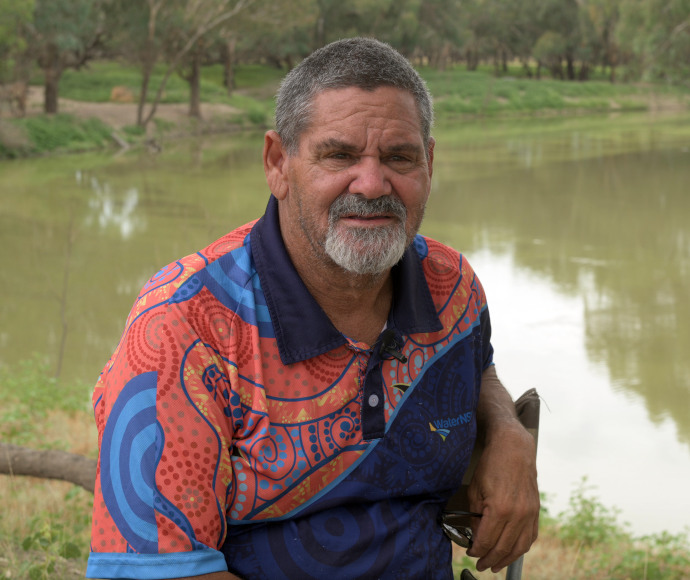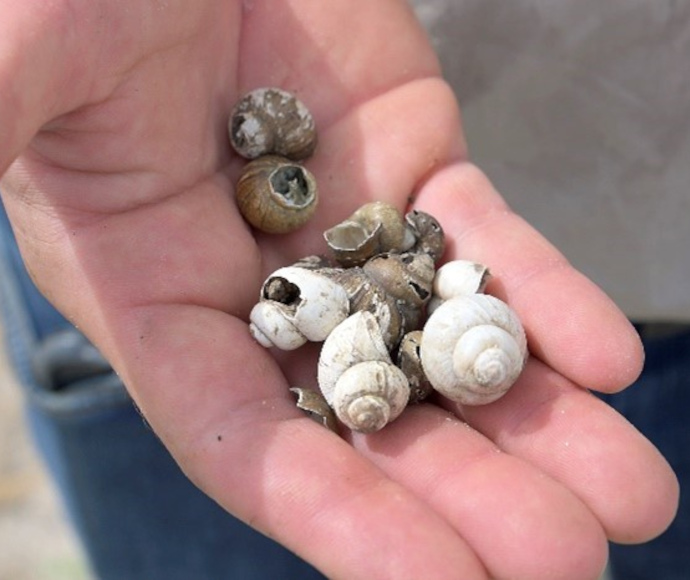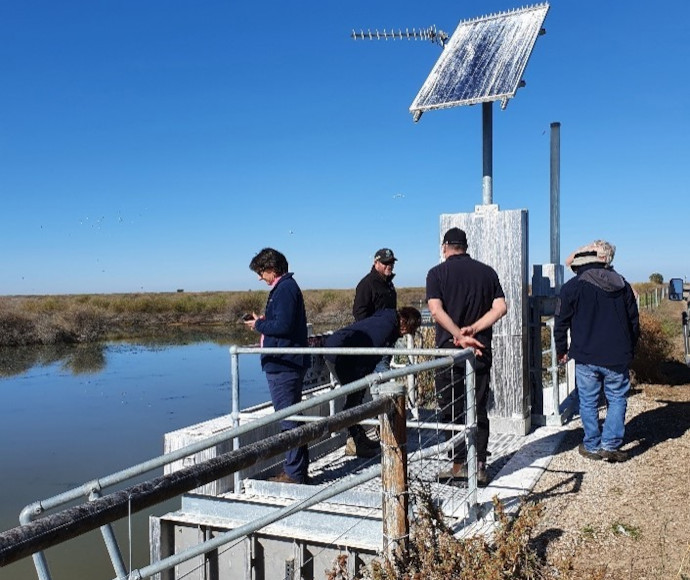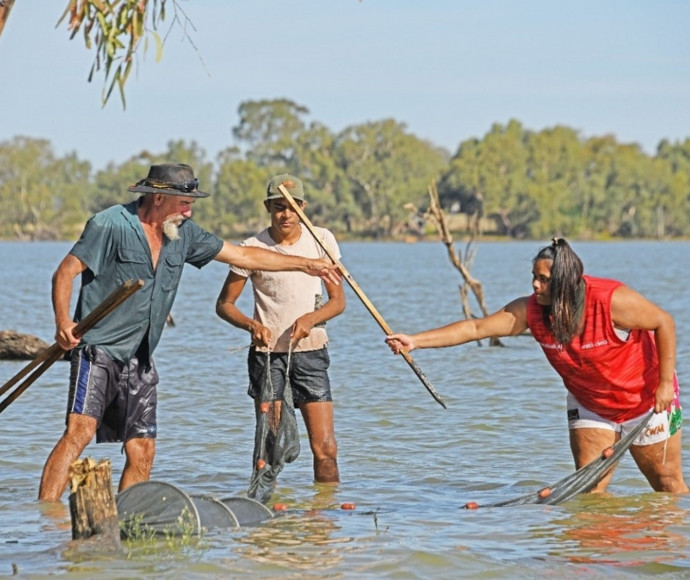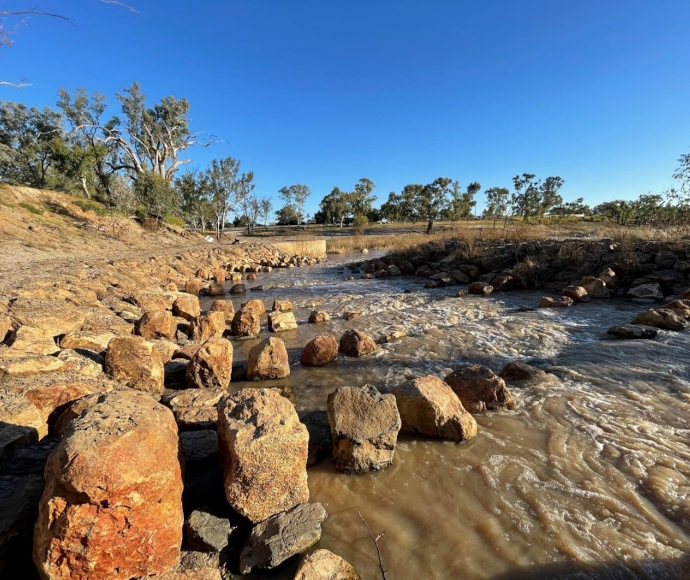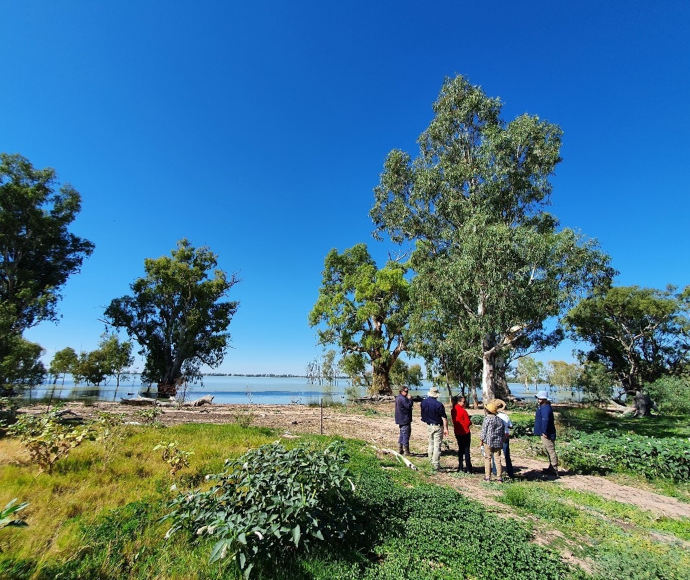These projects, including the case studies on this page, support Aboriginal Nations’ aspirations for water ownership, decision-making and landscape management. The initiatives are Nation-led and supported by water for the environment managers.
Tipintjiri (Darling River snail) survey
In 2023 Ngemba, Murrawarri and Barkinji people (Traditional Owners) from Brewarrina and Bourke surveyed 8 sites around the townships to search for the culturally significant and critically endangered tipintjiri on the Darling River. The survey uncovered signs of recent and past activity by tipintjiris.
At the Ngunnhu (Brewarrina Fish Traps) site, some tipintjiris were found in the soil within the fish traps. At the Cato Reserve, stronger evidence of recent activity and habitation was discovered. The Four-Mile Reserve provided little evidence of recent habitation, while the ochre site showed signs of recent activity.
In Bourke, evidence of recent and past activity was found at Davey's Reserve, the weir, and at the fishing reserve.
As no living tipintjiris were found at the survey sites, the Traditional Owners cannot definitively say that there is a large live population along the river.
Interestingly, discussions with local councils revealed that tipintjiris are inhabiting the town's raw water pipes. This indicates a flexibility in the tipintjiri’s habitat preferences.
Tea-tree mapping with Dharriwaa Elders Group around Walgett
We are working with the Dharriwaa Elders Group to map tea-tree health around Walgett in north-western New South Wales.
The Dharriwaa Elders Group’s River Rangers have been mapping tea-tree in the reserves and other public access areas along the river using their new mapping skills and tools (Arc GIS and Google Earth).
Tea-tree is an important species, providing habitat for yabbies and other macroinvertebrates that form an important part of the food chain. Tea-tree is thought to indicate historic base flow levels, giving an insight into the system’s past flow conditions.
Gayini annual environmental water planning workshop
We met with the Nari Nari Tribal Council to work through environmental water planning, priorities, and monitoring objectives for Gayini in the 2023–24 water year.
Gayini is an Aboriginal-owned and managed conservation area located in the lower Murrumbidgee valley in southern New South Wales. The Gayini Indigenous Protected Area (IPA) covers approximately 87,816 hectares of land, including the Murrumbidgee River and its surrounding areas.
The area holds cultural and historical significance for local Aboriginal people and provides key habitat for plant and animal species. The Gayini IPA is managed in collaboration with the Nari Nari Tribal Council and other stakeholders to protect its cultural and ecological values.
Planning discussions with the Nari Nari involved identifying and characterising significant sites, new watering options, monitoring program opportunities and priority works.
We look forward to partnering with the Nari Nari Tribal Council to support their aspirations for Gayini in water for the environment planning, management, and monitoring.
Bangerang's living culture
Keeping culture and language alive is a key priority of the Bangerang people of the Murray–Goulburn region of southern New South Wales.
In recognition, we are funding the development of a Bangerang language dictionary (Bangerang Dictionary). The Bangerang Dictionary details the process of finding a Bangerang word, phonetic pronunciation, and its English meaning. The finished product will be published online and made available through the Bangerang Aboriginal Corporation website.
The next phase of the language project includes the development of a Bangerang iconic species encyclopedia and a seasonal calendar.
Down the Track – Lake Cargelligo community
Down the Track works with young people living in the Lake Cargelligo community. The organisation helps young people to up-skill in positive activities, education, and training.
The NSW Water for the Environment program has partnered with Down the Track to create an environmental monitoring program. During school holidays, young people participate in a mentoring program led by Dr Joanne Lenehan (DCCEEW Senior Environmental Water Manager) and Dr Adam Kerezsy (aquatic ecologist).
'The kids love getting on Country, they love camping, they love understanding more about their surrounds and they love being able to share the information and facts they have learned with their friends and family. I often hear the kids saying to their brothers and sisters "Do you know that's a … bird and they like to nest." It has a direct knock-on effect – engaging with the community beyond just the kids.
'They see Jo and Adam's passion and it sparks an interest in occupations that are not traditionally found in Lake Cargelligo, where industry and employment is heavily focused on agriculture. Kids that can't count, learn how to count by the end of the weekend by monitoring birds, counting, and tracking their movements and then writing down the data.' Lana Masterson, CEO Down the Track.
Vision of a healthier Barwon-Darling
The input of Aboriginal peoples is a vital and valuable component of environmental water planning and management.
In April 2021, Northern Basin Aboriginal Nations (NBAN) and NSW Water for the Environment staff came together for a 2-day pilot workshop, with Aboriginal delegates developing priorities and objectives to guide water use in the Barwon-Darling. These included connectivity, water quality, identifying significant sites, iconic species and culturally important plants and trees.
Aboriginal delegates provided planning insights about timing and how water should be delivered to maximise healthy outcomes for Country.
We are currently supporting stage 2 of this project, with more in-depth, on-Country assessments happening across the region throughout 2023 and 2024.
Participating NBAN delegates included Euahlayi, Murrawarri, Ngemba, Ngiyampaa and Wayilwan.
Planning with Mutthi Mutthi people
The Mutthi Mutthi are the Traditional Custodians of lands in the south-western region of New South Wales, primarily around Balranald and the lower Murrumbidgee.
A group of 6 people standing and talking, on a track leading to a flat expanse of water, with trees and a clear blue sky behind them
The Mutthi Mutthi have a rich cultural heritage and deep connection to their ancestral lands. They have a strong spiritual and ecological relationship with the rivers, wetlands, and the diverse flora and fauna of their Country.
The Mutthi Mutthi are committed to working towards achieving social, economic, and environmental sustainability for their community. In support, the department has held workshops to develop the Mutthi Mutthi people’s plans for cultural flows, land acquisition and management, and water for the environmental priorities and objectives.
The Mutthi Mutthi envisage a future where their cultural identity is celebrated, their lands and waters are protected and thriving, and their community flourishes in harmony with their ancestral connections. This vision is guided by their deep cultural knowledge, custodial responsibilities, and aspirations for a sustainable and culturally rich future for their Country.
Establishing a Gwydir First Nations Environmental Water Group pilot
Aboriginal communities in the Gwydir catchment have a deep connection to land, water and sky.
A Gwydir First Nations Environmental Water Group was established in 2023 to work with the state and Commonwealth governments on environmental water management in the Gwydir.
The group has a strong focus on delivering outcomes that support culture, community, and Country. The group will support programs such as the Gwydir Reconnecting Watercourse Country Program with cultural impact assessments and related work and be protected by the Aboriginal Cultural and Intellectual Property Protocol.
